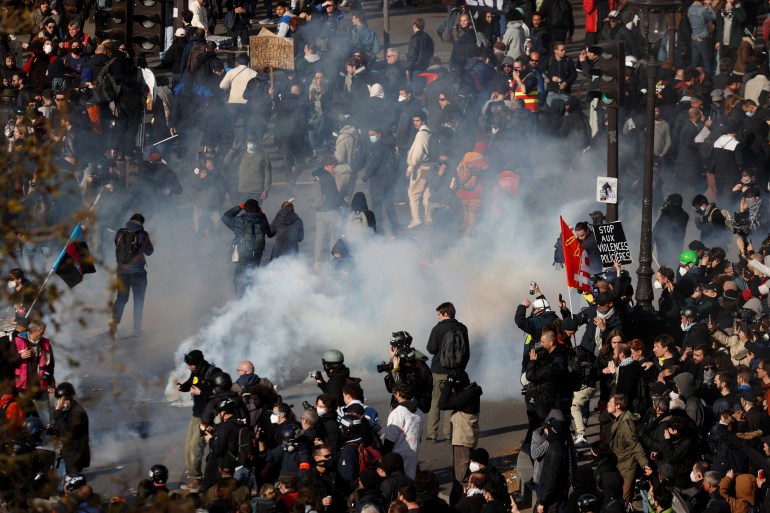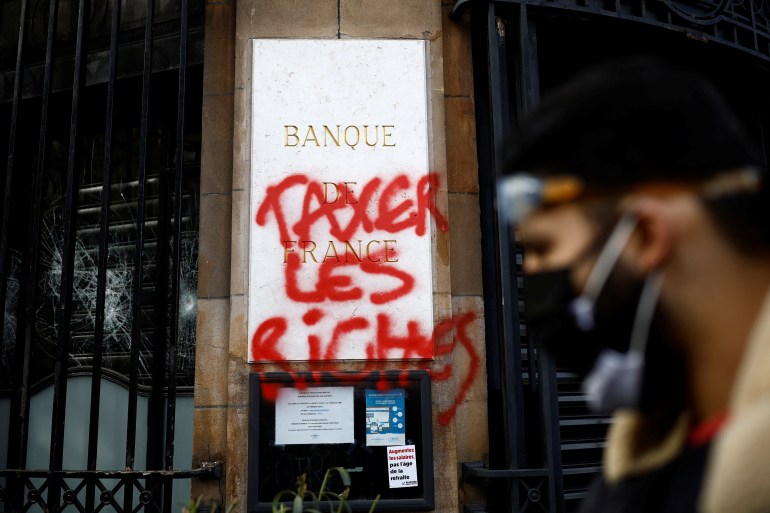Protests in France before Friday’s pension reform ruling
Protesters march in final show of anger before Friday’s ruling about whether Macron’s measures meet constitutional standards.

Protesters opposing President Emmanuel Macron’s unpopular plan to raise the retirement age to 64 have marched in cities and towns across France in a final show of anger before a decision on whether the measure meets constitutional standards.
In Paris, as thousands marched along the designated protest route on Thursday, some protesters holding lit flares veered off to the Constitutional Council, which is to decide on Friday whether to nix any or all parts of the legislation.
Keep reading
list of 4 itemsPhotos: Pension protests rage across France for 10th day
France’s Macron heckled by protesters in the Netherlands
France in Protest
They faced off with a large contingent of police deployed outside the building, where hours before the march got under way, other protesters had dumped bags of rubbish.
The rubbish piles were cleaned up but signalled the start of a new strike by rubbish collectors, timed to begin with the nationwide protest marches. A previous strike last month left the streets of the French capital filled for days with mounds of reeking refuse.
Trade unions called for the latest rallies and were expecting 400,000 to 600,000 participants.

Thousands also marched in Toulouse, Marseille and elsewhere. Tensions mounted at protests in Brittany, notably in Nantes and Rennes, where a car was burned.
In Paris banks and expensive stores secured their front windows with wooden boards but nevertheless, demonstrators broke into the headquarters of the French luxury group LVMH and set off firecrackers. The authorities deployed 11,500 police officers, 4,200 of them in Paris alone.
“The mobilisation is far from over,” the leader of the leftist CGT union, Sophie Binet, said at a rubbish incineration site south of Paris where several hundred protesters blocked rubbish trucks.
“As long as this reform isn’t withdrawn, the mobilisation will continue in one form or another.”
Wow. Another massive anti-Macron protest on the streets of Paris, France today that Western corporate media are trying very hard to ignore. pic.twitter.com/XNTEgAFNh7
— sarah (@sahouraxo) April 13, 2023
CGT has been one of the backbones of the protest and strike movement challenging Macron’s plan to increase France’s retirement age from 62 to 64.
Eight unions have organised protests since January in a rare voice of unity. Student unions have joined in.
Macron had initially refused a demand to meet the unions, but during a state visit on Wednesday to the Netherlands, he proposed “an exchange” to discuss the follow-up to the Constitutional Council decision. There was no formal response to his offer.
Critics have challenged the government’s choice to include the pension plan in a budget bill, which significantly accelerated the legislative process.
The government’s decision to skirt a parliamentary vote by using special constitutional powers transformed opponents’ anger into fury.
Polls have consistently indicated that a majority of French people are opposed to the pension re-form.

What happens on Friday?
Nine people sit on France’s Constitutional Council, whose job it is to decide whether a law is in line with the Constitution.
The council was expected to decide by the end of the day whether to partially approve, fully accept or reject Macron’s flagship pensions overhaul, whose headline measure is to push back the retirement age.
Left-wing and independent legislators, who have fiercely opposed the plan, were also hoping the council will approve a bid to organise a referendum on an alternative law to limit the retirement age to 62 – as is currently the case.
The council’s decisions will be binding.
On Tuesday and Thursday, left-wing lawmakers visited the council to urge them to completely ban the re-form.
They have argued that the government’s unorthodox method of resorting to a budget law to pass a pension re-form, as well as invoking controversial Article 49.3 of the Constitution to bypass a parliament vote, is grounds for it to be thrown out.